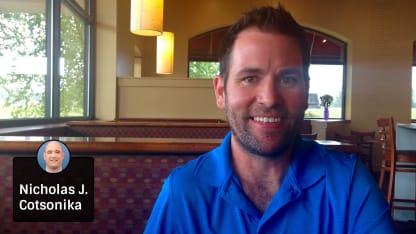ANN ARBOR, Mich. -- The first sign something was wrong probably came in the fall of 2013. Scott Matzka was putting up drywall in his garage when a finger on his right hand locked up.
More signs appeared early in 2014. If he opened the middle console in his car and reached for something, his right forearm cramped. If he clenched his right hand into a fist, he couldn't release it easily.
Former NHL prospect resolute in battle with ALS
Scott Matzka keeping up personal fight against Lou Gehrig's disease while trying to spread awareness

He was 35 then, married with two young children in Kalamazoo, Michigan, starting a new job as a consultant in the auto industry. He was two years removed from a career as a professional hockey player that included a training camp with the Nashville Predators, still an athletic man who ran, lifted weights, played racquetball.
He was used to his body obeying orders better than the average person, but he also was in tune with his body more than the average person. So he started researching on the internet, plugging in his symptoms.
What kept popping up was amyotrophic lateral sclerosis (ALS), better known as Lou Gehrig's disease, named for the New York Yankees great who died of the affliction in 1941, two weeks short of his 38th birthday.
ALS is a progressive neurodegenerative disorder that affects nerve cells in the brain and spinal cord, leading to the loss of muscle control, paralysis and death. There is no cure.
Eventually, the diagnosis was confirmed.
Matzka is 38 now and wears braces on the legs that skated for four seasons at the University of Michigan, where he assisted on the overtime goal that won the 1998 NCAA Championship and served as an alternate captain. His left leg always needs a brace; his right needs one if he has to walk more than 100 yards.

There is little strength in the arms and hands that scored 188 goals over nine seasons in the ECHL, American Hockey League and European leagues.
He cannot play golf like he used to, let alone hockey. He cannot button his clothes or open a Ziploc bag. He feels a heaviness in his tongue, and his voice has started to sound different.
Wednesday was his last day of work.
"Sadly," he said, "I am scratching the surface of what's actually going to happen to me."
For a long time, Matzka hesitated to talk about any of this, if only because every time he did, he ruined someone's day. But now, with a positive attitude, he's sharing his story to raise money for his medical care, to raise awareness of the disease and money for research, and to help healthy people appreciate what they have.
"I wish I could just live my life in Kalamazoo and ... not have to get out and do this," he said Wednesday in a coffee shop not far from where he played in college. "But I feel like I've been given a real opportunity that if I didn't grab it, I'd feel like, man, I would …
"I would regret …
"I would regret that forever."
\\*
Though Matzka never made the NHL, he went on a hockey adventure as a skilled forward.
After camp with the Predators in 2001, he played two seasons in the minors in North America: 109 games in the ECHL and 18 in the AHL. In 2002-03, he had 51 points (20 goals, 31 assists) in 45 regular-season games and five goals and one assist in 19 playoff games for Atlantic City, which won the ECHL's Kelly Cup.
From there he went to Germany, Denmark, Sweden, Finland and the United Kingdom, finishing as a player-coach and earning an MBA in Cardiff, Wales, before one final game with Kalamazoo of the ECHL in 2012-13.
He graduated from Michigan with a degree in computer science and could have started pursuing a more typical career sooner, but got to play hockey for a living and see the world.
"Even though you're not making NHL money, you're kind of a faux celebrity in these places," he said. "It was a great job to have for that many years. You're still living a dream. It's just a different dream than I had growing up."
The family settled in Kalamazoo, home of Matzka's wife, Catie. Matzka worked for Maestro, a computer software company, as a sales ambassador. Then he went to the Phoenix Group, a consulting company, to work in project development and leadership, helping automotive plants operate more efficiently.
Then he felt the symptoms.
In the spring of 2014, he told his wife what was going on and that he worried he had ALS, a difficult disease to diagnose. He went to his primary care physician for a series of visits and tests, then to a local neurologist.
The neurologist didn't believe Matzka had ALS because Matzka was so strong. But after more tests, the neurologist said he did think Matzka had limb-onset ALS. He classified it as "probable," between "possible" and "definitive."
"I wanted to say, 'No. Take it back. Stop talking,'" Catie Matzka said in a telephone interview. "I was like, 'I can't. No.' And I looked at Scott. And Scott is not emotional. He's just not an emotional person. And he instantly was tearing up. I'm sitting right next to him, and I can see it. It's shocking. You can't describe that feeling. You go through all of these emotions."
Scott Matzka called an old college teammate, Chris Fox, now a neurosurgeon. Fox helped him get in to see a leader in the ALS field at the University of Michigan in September 2014. That doctor agreed. It was ALS.
"You leave there, and that's it," he said. "I mean, there's just … There's nothing. It's, 'Go live your life.'"
Fifty percent of ALS patients live three to five years after the onset of the disease, 20 percent live 5 to 10 years and 10 percent live 10 years or more, according to Matzka's website,
scottmatzka.com
.
At first, Matzka lived for the moment and blocked out the future. He set out to travel and have as much fun as he could. But by September 2015, his diagnosis was "definitive," and by January, his symptoms had worsened to the point that he struggled with everyday activities.

Slowly and gently, he and his wife have been breaking it to their children: daughter Reese, 6, and son Owen, 4.
"When you're sick, you think you're going to get better," he said. "They're sick, coughing; they get better. Hurt your leg; you get better. That's been one of the biggest challenges, kind of letting them know Daddy might not get better. They'll say, 'It'll be awesome when you can come skate with me again or you can run with me in the yard.'"
He paused, cleared his throat and took a drink of water.
"We've talked to them about how Daddy's probably going to have to be in a wheelchair," he continued, "and that's about as far forward as we've gone."
Matzka spoke with John Frates, the father of Pete Frates, who captained the Boston College baseball team, played professional baseball in Europe and received an ALS diagnosis in March 2012. Pete Frates helped make the "Ice Bucket Challenge" -- in which people challenged others to dump a bucket of water on their heads or donate to the ALS fight -- a social media sensation in the summer of 2014. He is now paralyzed and unable to speak.
"What John Frates] said to me was, 'Pete had his opportunity to speak about the disease, spread awareness and do his part, but the disease has silenced him,'" Matzka said. "'Now it's your time. It's your time to carry the torch.'"
\*\*\*
Matzka sat down with a group of friends, talked about what they could do and started "My Turn," an organization dedicated to carrying that torch. Maestro, Matzka's former employer, designed a logo, created content and launched
[scottmatzka.com
in June.
The immediate concern is raising money for Matzka's medical care. He said at some point he will need a respirator, a feeding tube and around-the-clock care if he wants to stay alive. That won't be covered by insurance and could cost up to $250,000 a year, and eventually he wants to make a quality-of-life decision, not a financial one.
The lasting concern is raising awareness of ALS and money for research. The disease affects more than 30,000 people in the United States, according to Matzka's website, but is considered relatively rare and does not receive as much attention as other diseases, Matzka said.
Matzka wants to continue the momentum of grassroots efforts like the "Ice Bucket Challenge" but attract more corporate and government support. The estimated cost to develop a drug to slow or stop the progression of ALS is $2 billion, and only one drug has been approved by the Food and Drug Administration to date, according to Matzka's website.
"Obviously awareness only gets you so far," Matzka said. "Awareness without funding does nothing. But without awareness, nobody's going to pay attention. … In two years or three years, if there's not more significant progress, I think ALS goes back to where it was before, which is sort of unknown."
"My Turn" held a golf tournament in August and will participate in an ALS walk in October. Matzka has appeared on the field with the Detroit Tigers, spoken to the Western Michigan football team to explain the meaning of the "Ice Bucket Challenge" and made his own
in which a front-loader dumps water on him and his neighbors. It was posted on Facebook on Sunday and had more than 48,000 views as of Wednesday afternoon.
Matzka will drop the puck at his alma mater when Michigan faces Union on Oct. 8. He will return to Cardiff for a benefit game Oct. 25. He is working on a documentary, a first-person article, whatever he can.
"Seventy-five years after Lou Gehrig lost his fight with this disease, we're in the same spot," Catie Matzka said. "We need to keep this is in spotlight. This is such a horrific disease, and it's still impacting people. People are still losing the same fight. It's important for people to tell the story."
This will be Scott Matzka's legacy.
"My biggest impact is going to be in awareness and advocacy and spreading the word and connecting people and sort of empowering all the people around me to get behind fighting this disease," Matzka said. "I think 'My Turn' will ultimately be something that we create to live and breathe well beyond the years that I'm here."
To donate to the Matzka family, visit scottmatzka.com. To donate to the ALS Association, visit alsa.org.

















